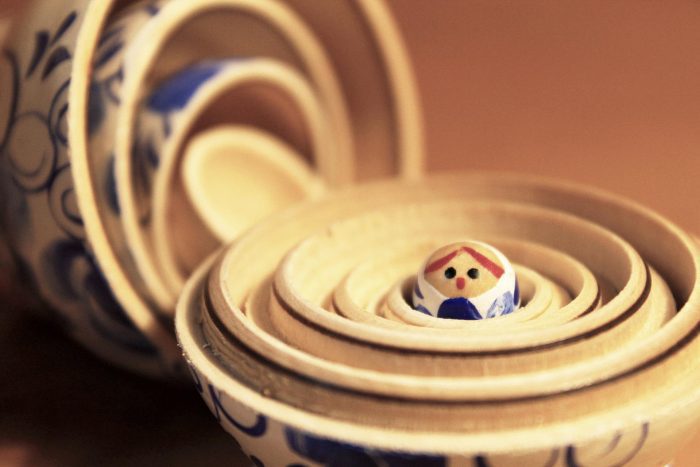Between You and Me: Could Putin’s plans be like the Russian doll, each aspect fitting within another?
By Leah S. Dunaief

Incredibly, one man has altered the world.
On Feb. 24, 2022, Russian President Vladimir Putin directed his troops into neighboring Ukraine, and the killing began. Ukrainians, Russian soldiers, mercenaries, sympathetic foreign fighters, civilians — all shot each other. Eastern Ukrainians were deported into Russia by the thousands, cities throughout Ukraine were destroyed, families were ripped apart, millions of Ukrainians fled to other countries, schools stopped, medical services halted, commerce and cultural activities were squelched, random bombings put lives in a lottery. Those are just some of the horrific consequences of Putin’s order against one country.
But the repercussions of that one act are being felt around the globe. Countries that depended on wheat and other agricultural supplies grown and shipped from Ukraine and Russia, are now frantically seeking alternate sources, if they can afford them. Oil and gas, primarily piped from Russia and Ukraine, have been cut off. Exports of hundreds of other products from these two countries have stopped. Oil and gas prices have skyrocketed, leading the way to global inflation. Nations have realigned geopolitically and militarily or strengthened their defense pacts by sending troops and weapons to allies. And other campaigns, to control climate change and suppress the coronavirus, have diminished as national budgets are modified.
What does Putin want?
There has been much speculation about his goals and his fears. They may have crystalized during these ensuing months, or Kremlin watchers may have caught on. One such scholar, who writes about Russia’s politics, foreign policy and, for a score of years, has studied Putin’s behavior, has put forth a cogent scenario in this past Tuesday’s The New York Times. Tatiana Stanovaya believes that Putin has a grand scheme whose goals are threefold.
The first is the most pragmatic: the securing of a land bridge through the Donbas region of the southeast to Crimea. Russian troops seem to have already captured Luhansk, which is part of the Donbas. Apparently, Putin believes the West will accept that Russian troops cannot be dislodged from there and will not cross any red lines to directly engage in such a military effort, eventually abandoning the idea and the territory to Russia.
The second goal is to force Kyiv and the Zelensky government to capitulate from exhaustion and demoralization after one or two years. Russia would then launch a “Russification” of the country, erasing Ukrainian culture and nationhood and imposing Russian language, culture and education. Thus Russia would have expanded its territory and stopped NATO from reaching Russia’s current borders.
The third goal is the most ambitious: Putin wants to build a new world order. “We are used to thinking that Mr. Putin views the West as a hostile force that aims to destroy Russia,” according to writer Stanovaya. “But I believe that for Mr. Putin there are two Wests: a bad one and a good one.”
The “bad” one is the one currently in power and led by elites who are “narrow-minded slaves of their electoral cycles who overlook genuine national interests and are incapable of strategic thinking.” And the “good West”? He believes that “these are ordinary Europeans and Americans who want to have normal relations with Russia and businesses who are eager to profit from close cooperation with their Russian counterparts.”
Today, Putin is convinced, the bad West is declining while the good West is challenging the status quo with nationally oriented leaders like Viktor Orban in Hungary, Marine Le Pen in France, and Donald Trump, “ready to break with the old order and fashion a new one.”
The war against Ukraine, with its undesirable consequences like high inflation and soaring energy prices, “will encourage the people to rise up and overthrow the traditional political establishment.” This fundamental shift will then bring about a more-friendly West that will meet the security demands of Russia.
If that has a familiar echo, it is not so different from the Communist expectation that the proletariat will rise up and embrace Marx and Lenin. We know how that turned out.







